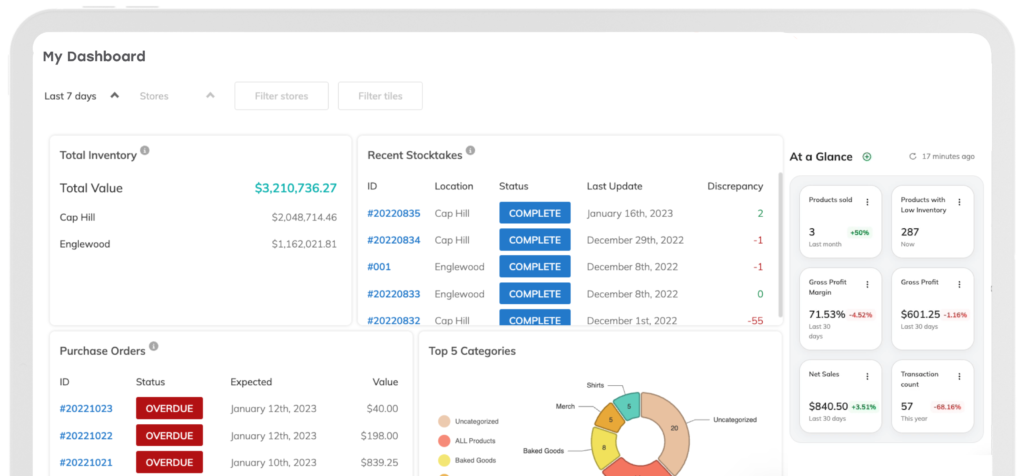
Turn Your Seasonal Business Into Year-Round Profitability Like Barton Springs Nursery
Not all plants grow year-round, but Barton Springs Nursery’s sales certainly do — and your seasonal business can, too. That may come as a surprise: when you first think of a seasonal business, chances are you think about limited income or products that are difficult to sell outside of certain seasons. In reality, there are ways to expand your products and services so your company enjoys year-round profitability.
Barton Springs Nursery has taken this goal to heart through its on-site renovations, operational improvements, and event services. During Barton’s off-season, instead of waiting for the next busy period, this seasonal business’s owners take proactive steps to explore other opportunities. The strategies they use benefit any organization looking for steady success every month.
What Is A Seasonal Business?
A seasonal business is an entity that, unlike most companies, brings in most of its annual revenue over a few weeks or months. A Christmas tree farm, for example, makes most of its money in November and December.
Barton Springs Nursery is also a seasonal business. Most of its revenue comes during the spring, when the weather is mild and people are able to spruce up their yards and gardens.

The Pros And Cons Of Running A Seasonal Business
The benefits of running a seasonal business
- More time to prepare for your busy season. Running a seasonal company gives you the advantage of knowing exactly when your busy times and slow periods will be. In the off-season, you’ll plan out your budget, test new marketing strategies, and train new employees.
- Cost-savings via personnel hiring. Seasonal businesses only need extra help during certain times of the year. You’ll save money by hiring temporary staff instead of keeping permanent employees year-round. Your employees from last season are easy hiring choices for your next peak season too, making for an easier hiring season.
- Narrower, more targetable customer base. Because most of your sales occur during one season, you can focus on a smaller group of customers compared to companies selling year-round. For example, a pumpkin patch that’s busiest during the fall will tailor its marketing materials and efforts to families looking for fun autumn activities.
The challenges of running a seasonal business
- Times of the year with little to no income. Running a seasonal business sometimes means facing periods when there isn’t much money coming in. During these slowdowns, you might find it tricky to generate enough revenue to cover your expenses.
- Maintaining brand awareness. You’re faced with the challenge of generating excitement for your company during the off-season. After all, few people are shopping for beach toys in October. However, it’s important to remind customers about what you offer even outside your busiest time. Otherwise, they might not think to visit during your next season.
- Inventory storage. Owning a seasonal business means you need somewhere to store your inventory when you’re not moving products. However, renting storage space for the entire year can be pricey.

Why Should Seasonal Businesses Look Into Year-Round Profit Channels?
Improve customer loyalty
Seasonal businesses benefit from profit channels that keep customers engaged even during slow periods. Catering to shoppers throughout the year builds trust and confidence. They know they can rely on your company beyond your main season.
A longer operational window also increases opportunities for building meaningful relationships with your customers. You’ll have more time to get feedback and use it to improve satisfaction and, ultimately, customer loyalty.
Boost cash flow
Profit channels that operate every day of every month give seasonal businesses a steadier income, reducing financial strain during off-peak times. These funds help cover operational costs and investments, keeping your company afloat throughout the year. Your business will plan ahead better, invest in growth, and produce quality products without major financial concerns.
Stabilize inventory turnover
By working to be profitable at all times, a seasonal business owner can more effectively manage and use their inventory. This approach allows your company to maintain a steady flow of inventory in and out of the backroom.
Take, for instance, a surf shop located in a northern coastal town. During the summer months, there’s high demand for surfboards and swimwear. However, customer traffic slows down significantly during the colder months. By diversifying its offerings to include winter sports like ice fishing, the surf shop maintains its sales throughout the year. Profits from winter sales also help offset the cost of storage.
Gain a competitive edge
Embracing all kinds of profit channels in both the on- and off-seasons means a seasonal business separates itself from similar companies and adds an edge to its competitive analysis. For two similar companies in the same area, the one that stays active and forms connections with customers during the off-season gains a big advantage. When the peak season rolls around, people will remember their more recent shopping experience with that company and are more likely to choose it over a competitor.
5 Ways To Foster Year-Round Success
1. Diversify your sales channels
A seasonal business owner taps into new revenue channels and maximizes their earning potential when they sell items beyond their usual offerings. This provides continuous value to customers and gives them new ways to shop with your company.

For example, you might launch a subscription service that sends customers a curated box of products from your company every month. Where a truly seasonal business model doesn’t leave much room for monthly deliveries, expanding your services helps you engage your customers and make sales.
This is just one possible example of multichannel selling, which introduces your company to a larger audience. It involves expanding beyond how you typically sell your products so you can reach many customers through various avenues throughout the year.
For another example, let’s say you sell winter clothes out of your brick-and-mortar store, which you close in the summer. Consider launching an e-commerce site to sell to other locations that are cold when your area is nice and warm. This way, you make sales across the country — and maybe even the world — when your main location goes through its slow season.
Get Another Channel Up And Running In No Time
Thrive Inventory reduces barriers to opening another sales channel by quickly syncing inventory and getting you up and running in no time.
2. Add new offerings
Introduce new products that complement the ones you currently sell to cater to different seasons or customer needs. An expanded product assortment often gives a business owner more earning potential throughout the year.
In the previous example of the surf shop, adding ice fishing gear to the inventory allows the company to reach a new customer base. This business strategy keeps enough cash coming in during the wintertime.
3. Host events
Organizing events or workshops related to your niche attracts people and drives sales during slower periods. If your location is a unique or attractive venue, rent out your space for private events such as weddings, birthday parties, or corporate gatherings. For instance, if you close your winery tasting room down during the winter months when you’re done harvesting, consider partnering with an event planner to make use of the space.
4. Partner with other small businesses
Adding more revenue streams through year-round channels opens up more chances to partner with other businesses. Imagine your company sells holiday-themed decorations. You might expand to sell home decor items, such as vases and wall art, that complement customers’ homes throughout the year. From there, interior design companies, home renovation contractors, or home stagers become valuable partners that bring in more business.
Collaborating with non-competing companies whose seasonality is the opposite of yours especially benefits both companies. In the earlier example of the Christmas tree farm, that company might partner with a wedding planning organization to bring people on-site throughout the year. This approach introduces people to the farm who might not have visited before.

As a result, the Christmas tree farm brings in revenue and exposure outside the holiday season. At the same time, the wedding planning company gives clients a picturesque setting among all the trees for their special day. This relationship is a win-win for both companies and sets up profitability that leads to a long-term partnership.
5. Retain staff to invest in new endeavors
When expanding your business model, you need a team that understands where you’re taking your company. Your team should also stick around for long enough to contribute to its growth. Instead of hiring seasonal workers who come and go, consider keeping your employees year-round.
This gives employees time to learn the ins and outs of your operations and feel more connected to your business. You don’t necessarily need a large team — just one that’s eager to learn and works well with the ebbs and flows of seasonal changes.
How Barton Springs Nursery Reinforced Its Seasonal Business
Barton Springs Nursery in Austin, Texas is the definition of a seasonal business — most of the company’s revenue occurs in two months during the spring. When Amy Hovis and Greg Thomas purchased the business in 2021, they decided to revamp the nursery, mainly by setting up year-round revenue streams. In the years since then, Barton Springs has become a hub of mini-businesses that complement standard nursery offerings.
Recognizing the need for versatility
In the first two years after becoming the nursery’s new owners, Hovis and Thomas focused on making major changes.
“With any business, if you’re not thinking of the long term, then you’re just not doing it right,” Hovis said.
A key point in Hovis’ and Thomas’ five- and 10-year business goals was diversifying the business for year-long growth.
“We don’t necessarily want to be stuck to the nursery,” Thomas said. “It just feels like a very volatile industry. … We’re struggling with freezes and droughts…so a lot of people are changing their buying habits. We’re changing with them and trying to figure out what we can adapt to.”

A new business model
Hovis and Thomas use the Barton space for activities beyond selling plants. A gift shop, food truck, pottery installations, and a skincare line are all profitable ventures that are now part of the larger business. There’s also the popular Genus Bar where Barton shoppers receive plant education and advice from an onsite specialist. By running several smaller types of businesses within one space, Barton Springs caters to customer needs at all times of the year.
“That’s how we see the long-term success of our company,” Hovis said. “It’s not isolated to this one industry of selling plants… That is a way for us to bring in income during the months where we can’t be selling plants because it’s either freezing or way too hot.”
Hovis and Thomas also use their space for more than selling products. The lush scenery of the nursery and its grounds creates the perfect setting for events. The couple acted on this observation, cleared out a space that once stored dirt, and renovated a nearby structure.
“We built a small stage and hung some string lights…and the space developed from there,” Thomas said.

Since the renovation, Barton Springs has welcomed weddings, lectures, and even a holiday dinner party. The decision to host events at the nursery has proven to be incredibly successful and ranks among the business’s fastest-growing revenue sources.
Operations that keep pace with business growth
To keep up with the business’s many demands, a team of employees is on staff year-round.
“Usually, people within this industry would hire seasonally, so you would let all your staff go in the slow time,” Thomas said. “When we got on, we decided to keep everyone all year long and use them to accomplish these projects.”
The couple’s latest project is setting up and launching an e-commerce site that will host thousands of products from the nursery.
“When we’re expanding our business, [we’re] really just adding services,” Thomas said. “They don’t cost much. You don’t have to build.”
“We’re really looking at all these ideas we can do to maximize the audience that we’ve created and to be able to make money year-round,” Hovis said.
Strategies For Growing Faster Than Plants
Running a seasonal business doesn’t have to mean you only bring in short-term profits. There are plenty of business strategies you can use to expand your revenue streams all throughout the year. To learn more about Barton Springs Nursery’s careful planning of new profitability routes, check out The Power Up’s episode “Planning Makes Perfect.”
The Newsletter For Small Businesses
Weekly expert insights, industry trends, and inspiring stories designed to help you run your business with confidence.
The Only Inventory System That Actually Helps You Run A Healthy Business
Thousands of customers all over the world use Thrive Inventory to run a healthy business.
Thrive Inventory gives you control over all your inventory, sales channels, and metrics, allowing you to make the right decisions at the right time.
Keep Reading

The Newsletter For Small Businesses
Weekly expert insights, industry trends, and inspiring stories designed to help you run your business with confidence.
Try Thrive Inventory For Free
Add Thrive Inventory to your business and maximize your potential. With powerful and easy-to-use products, it’s time to take control of
your business and see what you can do with Thrive.




